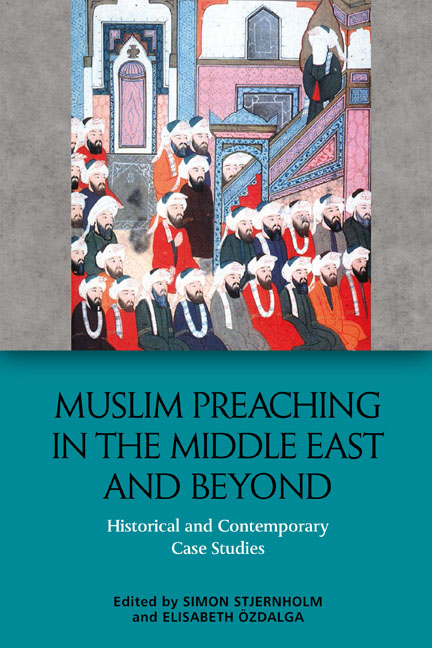Epilogue
Published online by Cambridge University Press: 20 October 2020
Summary
The fact that a Muslim Friday noon service, including its sermon, the khuṭba, does not look or sound very different today compared to what it did a hundred or several hundred years ago, should not deceive us into thinking that the wider dynamics into which it is embedded have been left untouched. The deep transformations of modernisation have struck religious institutions and communities as much as it has hit economic, social and political structures and relationships. Considering Muslim homiletics, the wider sphere of preaching of which the khuṭba is but one genre, there are perhaps two forces of change that have been especially significant: the emergence of the nation-state and the development of modern mass media. Without denying the impact of other forces, this epilogue will briefly discuss the significance of changes within these two fields, as well as point to series of questions they give rise to.
With respect to the Middle East, the development of the modern nationstate is closely connected to colonialism and the outcomes of the two world wars. Access to and use of modern mass media among broad population groups, including television, cassettes and the Internet, is of more recent date. Yet, however strong the power of transformation, the forces of tradition do not yield so easily. Concerning Muslim homiletics, much of its liturgies, discourses of authority, and willingness (or need) to invoke the same authoritative sources are preserved, while the uses to which they are put, and negotiations of their potential meanings, are subject to change.
The Emergence of the Nation-state
The modern nation-state is a centralised and complex organisation of more or less formal institutions. The effects of its growth on religious life have varied both between and within different cultural contexts. Modern Turkey offers a striking example of how the state, in its capacity as a newly born nation-state, took control over religion and, in a few years’ time, gave it a new organisational structure. During this process, a large number of previously vital religious institutions and practices were put under direct state control. For instance, all judicial functions were taken over by the secular state; education of religious personnel was transferred to the Ministry of Education; Sufi brotherhoods of all kinds were banned. ‘Religion’ thus got a new, circumscribed definition, more or less limited to worship, prayers and oratory in the mosques.
- Type
- Chapter
- Information
- Muslim Preaching in the Middle East and BeyondHistorical and Contemporary Case Studies, pp. 201 - 205Publisher: Edinburgh University PressPrint publication year: 2020



